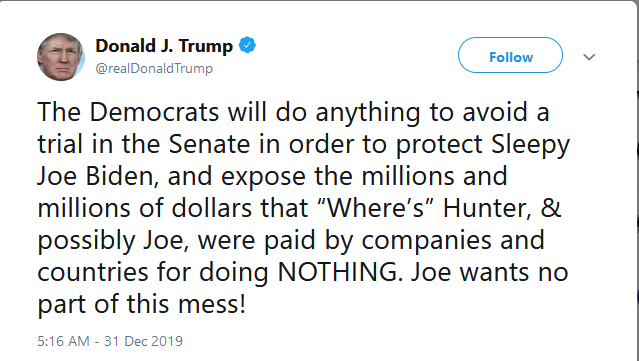Trump slashed funding to fight corruption in Ukraine – proof that when he extorted Ukraine to produce smears against his political rival, he was motivated purely by personal gain, not a crusade against corruption
I hope this evidence is presented by Democrats during the Senate trial. It’s something every American can understand. Trump only cares about his own personal gain; he doesn’t care one iota about our nation. If we can keep drilling on that message, maybe it will eventually penetrate the barrier of willful ignorance thrown up by Trump’s base.
In parallel with slashing anti-corruption budgets, Trump ousted the U.S. Ambassador to Ukraine, Marie Yovanovitch, who had built her career on combating corruption. Trump and his co-conspirators (Giuliani and the indicted Parnas, Fruman, and Correia) got rid of a corruption fighter so they could advance their own corrupt schemes. This was clearly presented during the House impeachment hearings and will be repeated in the Senate trial. That damning evidence becomes even more compelling when you add these revelations that, at the same time, Trump was drastically cutting funds to fight corruption.
The Trump administration has sought repeatedly to cut foreign aid programs tasked with combating corruption in Ukraine and elsewhere overseas, White House budget documents show, despite recent claims from President Trump and his administration that they have been singularly concerned with fighting corruption in Ukraine.
Those claims have come as the president and his administration sought to explain away a July phone call between Trump and Ukrainian President Volodymyr Zelensky, during which Trump pressured his counterpart to open investigations into Joe Biden and his son Hunter, and into a debunked conspiracy theory involving a hacked Democratic National Committee computer server.
“I don’t care about politics, but I do care about corruption. And this whole thing is about corruption,” Trump told reporters earlier this month when discussing the Ukraine issue. “This whole thing — this whole thing is about corruption.”
The phone call is central to the impeachment inquiry by House Democrats. The Democrats have accused Trump of holding back a congressionally approved military aid package for Ukraine until Zelensky publicly committed to launching investigations into the Bidens. On Tuesday, the senior U.S. diplomat in Ukraine — acting ambassador William B. Taylor Jr. — told lawmakers that Trump made the release of military aid to Ukraine contingent on public declarations that it would investigate the Bidens and the 2016 election.
Trump, acting chief of staff Mick Mulvaney and other administration officials have insisted repeatedly that their goal in delaying the military aid package to Ukraine was to ensure corruption was addressed in that country — not to produce political benefit to Trump.
“There were two reasons that we held up the aid. We talked about this at some length. The first one was the rampant corruption in Ukraine,” Mulvaney said on “Fox News Sunday.” “Corruption is a big deal; everyone knows it,” he said. (The second reason was to ensure that other nations contributed to Ukraine’s defense, Mulvaney said.)
The administration’s professed interest in fighting corruption in Ukraine has not been reflected in its annual budget requests to Congress.
For example, the administration sought to cut a program called International Narcotics Control and Law Enforcement. Among the goals of the program, as described in White House budget documents, is “helping U.S. partners address threats to U.S. interests by building resilience and promoting reform in the justice and law enforcement sectors through support to new institutions and specialized offices, such as Ukraine’s National Anti-Corruption Bureau and Special Anti-Corruption Prosecutor’s Office.”
The program directs specific sums of money to individual countries. In 2019, $30 million was directed to Ukraine, after Congress rejected an administration request to cut the sum to $13 million. In its 2020 budget request, released in March, the administration again sought to cut the program’s spending on Ukraine to $13 million. Congress seems likely to once again reject the proposed cut, although lawmakers have yet to agree on any spending bills for the 2020 budget year that began Oct. 1.
In another example, the administration sought to streamline a number of overseas democracy assistance and foreign aid accounts under one larger umbrella called the Economic Support and Development Fund. The White House believed that consolidation would cut those programs by more than $2 billion. This fund, too, is aimed at fighting corruption in countries around the world, among other goals, according to White House budget documents. Spending in Ukraine for the accounts in question was $250 million in 2018; the White House has asked for $145 million in 2020 under the new iteration of the program.
Democrats have alleged the White House’s recent comments on combating corruption aren’t consistent with the administration’s track record.
“Numbers don’t lie,” Senate Minority Leader Charles E. Schumer (D-N.Y.) said in a statement. “It’s even more clear now that President Trump is not the anti-corruption crusader he claims to be.



 Kupperman lawsuit dismissed.
Kupperman lawsuit dismissed.
